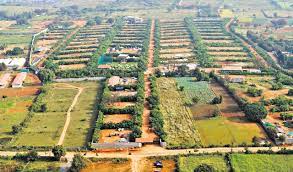The largest artificial forest in the nation has been created by Stone Craft Group at Kavvaguda, close to Shamshabad.
Hyderabad: Enjoying life in the lap of nature, surrounded by lush greenery, waking up to the sound of birds, and going for walks in the cool, comforting wind.
Who wouldn’t want to imagine and strive for such a life? The idea of eco-friendly living is gaining popularity these days, and many people are eager to construct their ideal home in the centre of tranquil, lush expanses surrounded by nature.
How about a home in Kavvaguda, close to Shamshabad, which happens to be the largest man-made forest in the nation? The Stone Craft Group, directed by Kirthi Chilukuri and Anusha Podduturi, has created a 62-acre real estate project named Woods that includes the 18-acre woodland in Kavvaguda.
The Miyawaki technique, invented by Japanese botanist Akira Miyawaki, aids in creating thick, quick-growing forests with native species, and is used to create the forest.
The forest, which has more than 4 lakh trees and attracts a variety of bird, butterfly, and dragonfly species, took three years to develop. Kirthi Chilukuri notes that the goal is to recreate the time when humans coexisted with nature and lived close to it, noting that there are over 100 kinds of birds have been observed nearby.
“When 2019 first arrived, we were unsure of how we would use the property. With the Covid pandemic, we realised how individuals were impacted by oxygen deprivation, which sparked the idea of creating a self-sustaining forest,” he stated.
The Stone Craft team laboured to comprehend the ecology of the area, select local plants, and properly prepare the soil with the aid of Ravi Kumar Kumbham, the project’s lead architect and landscape designer.
“In order for the trees to develop considerably more quickly, the Miyawaki technique requires native trees and the proper soil. In order to find the seedlings, we visited many forest nurseries across India and selected 140 native trees within a 50-km radius. We simply continued sowing,We quickly finished covering 18 acres,” he continued.
In order to prepare the soil, Kirthi Chilukuri revealed that they first prepared the ground using a mixture of sand, red soil, and coco peat, a particular combination that aids in moisture retention. A dairy farm’s natural manure was applied to the land.
On the remaining site, 76 eco-friendly homes are being erected; to access them, one must cross a bridge built across a forest. Ten feet of the plot’s border have been trenched to create a forest, and a retaining wall prevents reptiles from accessing the area.
There are currently 128 natural fruit and flowering tree species in the forest, including the Gulmohar, custard apple, and Indian hog tamarind, neem, Peepal Indian soapberry, plum, java olive, and java plum. Even more impressively, the Stone Craft crew was able to GI-tag every tree in the forest.







